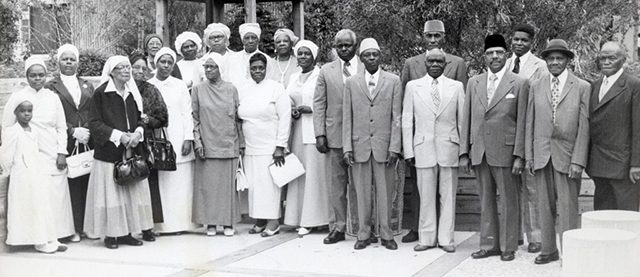
Oral History Interview with Shaykh Kafani Ibrahim Cisse on August 8, 2020
Files
Loading...
Interviewee
Cisse, Shaykh Kafani Ibrahim
Interviewer(s)
Cook, Ayesha; Perkins, Dr. Alisa (Research Director)
Description
Oral history interview with Shaykh Kafani Ibrahim Cisse conducted by Ayesha Cook on August 8, 2020. Interview written by Dr. Alisa Perkins (Research Director) and Ayesha Cook. Kafani Ibrahim Cisse, respectfully known as Shaykh Kafani, was born in 1968 in Flint, Michigan, to parents who hailed from Louisiana and Mississippi. Shaykh Kafani was raised in a close-knit, extended family whose members identified as Christian. His father was the first Black Vice President of an investment company called the Household Finance Company. Shaykh Kafani’s family moved to Detroit, Michigan while he was growing up, and he attended Detroit Public Schools. After discovering his talent for the performing arts, Shaykh Kafani enrolled in an arts program at Cass Tech High School, and then studied dance and modeling at Wayne State University. Shaykh Kafani was a prominent creative force in Detroit’s hip-hop scene. He traveled across the world with various groups, performing for audiences in Europe, the Caribbean, and the United States. Shaykh Kafani embraced Islam when he was around twenty-two years old, based on the influence of Muslim friends. After reverting to Islam, Shaykh Kafani traveled to Senegal to deepen his study of Islam and the Qur’an under the tutelage of prominent shaykhs. He earned a diploma from the African American Islamic Institute in Senegal. After returning to the United States, Shaykh Kafani made great efforts to spread the knowledge gained from his travels as a sought-after religious teacher and mentor to Muslims across generations. In his interview, Shaykh Kafani reflects on how he maintains Muslim morality and modesty while participating in the performing arts. He explores the impact that his time in Senegal had on his spiritual development and understanding of the world. Shaykh Kafani also discusses the importance of Detroit’s African and African American Muslim institutions for cultivating spiritually-informed, anti-racist consciousness and practice.
Date of Interview
8-8-2020
Location of Interview
Detroit, MI (Interview conducted over Zoom)
Keywords
Acting, African American Islamic Institute (AAII), African culture, African diaspora, African dress, African-American business leadership, African-American history, African-American Muslims, Alexandria, American culture, Ancestral connection, Anime, Anti-racism activism, The Apollo Theater, Arabic language education, Aretha Franklin Theater, Juan Atkins, Bearing witness, Belleville Three, Bible study, The Black Church, Black Muslim Psychology Conference (BMPC), Buddhism, Bullying, California, Cambodia, Jermaine Carey, Caribbean, Cass Cafe, Cass Mosque, Cass Technical High School, Catechism, Catholic sacrament, Catholicism, Center for Islamic Knowledge, Chanting in Islam, The Charles H. Wright Museum of African American History, Choreography, Church culture, Church of God in Christ (COGIC), Cipher circle, Shaykh Hassan Cisse, College for Creative Studies, Colorism, John Coltrane, Community development, Community leadership, Comparative religion, Conversion to Islam, Costume design, Mark Crain, Usman dan Fodio, Dance, Dar-ul-Islam Movement, Dashiki, Miles Davis, Deep South, Detroit, The Detroit Institute of Arts, Detroit Techno, Dhikr, Shea Diamond, Disclosure, Dream of Detroit, Elder respect, Eminem, Europe, Family gathering, Family history, Family reunion, Shaykh Ahmed Tijani Favors, Festival Summer Program, Flint, Formerly incarcerated citizens, Eddie Fowlkes, Friday prayer service, Gaming, The Great Migration, Haji Abdul Hakim, Hardcore Detroit, Hart Plaza, The Hip Hop Shop, Hip-hop music, Historical inaccuracies, Household Finance Company, Imam, Intergenerational relation, International travel, Interracial congregation, Interracial relations, Investment company, Islam, Islam in America, Islam in prison, Islamic Community of As Salaam (ICASMI), Tablighi Jamaat, Jazz music, Jesus Christ, Joe Louis Arena, Imam Salim Joseph, Louisiana, Martin Luther, Lutheranism, Malaria, Maurice Malone, Marvel Comics, Derrick May, Shaykh Muhammad Adeyinka Mendes, Michigan, Michigan Works, Modeling, Modesty, Thelonious Monk, Morality, Mosque, Muhammad Mel Wanzo Halal Jazz Cafe, Muslim Center Mosque and Community Center, Muslim Americans, Muslims, The Muslim House, Inc., Muslim Mental Health Conference, Muslim unity, Dr. Haleem Naeem, Shaykh al-Hajj Ibrahim Niasse, Nigeria, Northwestern High School, Oppression, Pentecostalism, Performance, Performing arts, Prayer Service, Praying, Prison justice, Prophet Muhammad, Qur'an education, Qur'an memorization, Qur'an recitation, Racism, Religion, Religious education, Religious leadership, Reversion to Islam, The Rhythm Kitchen, Ritual, Saint Timothy Lutheran Church, Malia Kai Salaam, Schomburg Center for Research in Black Culture, Senegal, Shahada, Soup kitchen, Southern United States, Spiritual order, Spiritually seeking, Storytelling, Sunday school, Superheroes, Systemic racism, Taoism, Tarrying, Techno dance group, Third Earth Music, University Islamic Center of Detroit, University of Cambridge, University of Michigan, Urban-suburban relations, Vietnam War, Dr. Bilal Ware, Wayne State University, West Africa, White supremacy culture, Dr. Zachary Wright, Shaykh AbdulKarim Yayha, Youth mentorship
Disciplines
African American Studies | Africana Studies | American Studies | Civic and Community Engagement | Community-Based Research | Digital Humanities | Ethics in Religion | Inequality and Stratification | Islamic Studies | Nonprofit Administration and Management | Politics and Social Change | Race and Ethnicity | Religion | Urban Studies and Planning
Language
ENG
Document Type
Interview
Rights Statement
Dream of Detroit Interviews were made possible by funding from the Pillars Grant and Whiting Foundation. Content is for educational purposes only and non-reproducible; interviews are not to be duplicated, but may be linked through ScholarWorks with appropriate attribution. Please direct any questions about copyright to scholarworks@wmich.edu.
Funder
Pillars Fund and Whiting Foundation
Grant
Dream of Detroit
Length of Video Log
1:31:46
Recommended Citation
Dream Storytelling Project Team, "Oral History Interview with Shaykh Kafani Ibrahim Cisse on August 8, 2020" (2020). Dream Storytelling Interviews. 39.
https://scholarworks.wmich.edu/dream-storytelling-interviews/39




Notes
Interview conducted online over Zoom by Ayesha Cook. Written by Dr. Alisa Perkins (Research Director) and Ayesha Cook. Facilitated by Dr. Alisa Perkins and Ismaeel Dhul-Qarnayn. Video Edited by: Brooklynne Bates. Transcribed by: Delaney Novak. Transcription edited by: Dr. Alisa Perkins. Metadata by: Meghan Murphy. Metadata edited by Dr. Alisa Perkins and Sophia Wimberley.